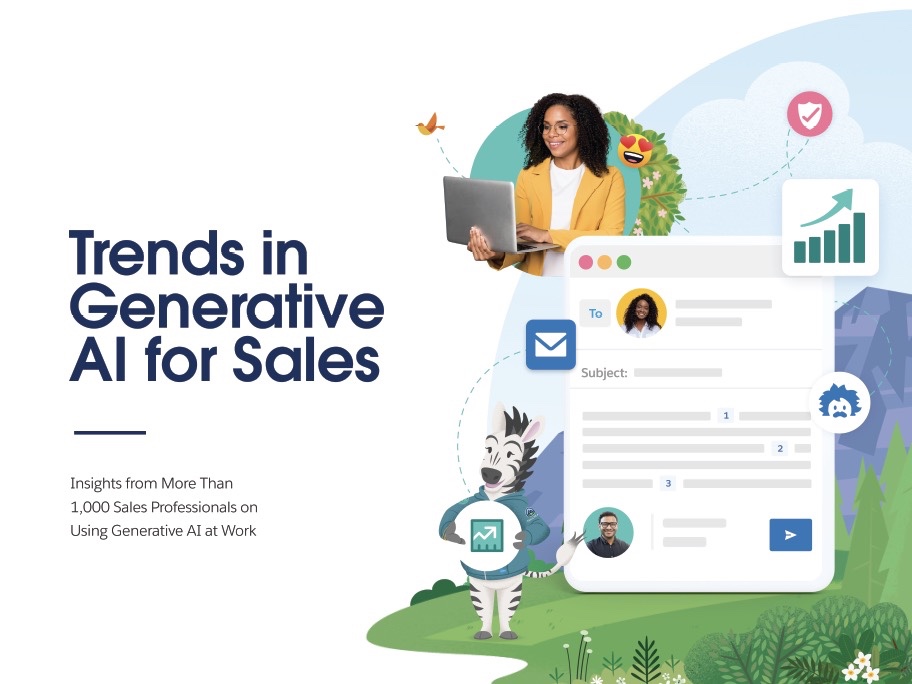Most reps I know are motivated by building relationships and bringing real-life solutions to customers, not crunching numbers or drafting emails. Fortunately, generative AI can help take the drudge work off their plates by drafting communications, conducting research, and streamlining sales process tasks. I don’t see it replacing reps any time soon, but AI will certainly affect the way we work in the coming months and years. More details on that below.
Hot off the press: the freshest trends in generative AI for sales
Discover how 1,000+ sellers are using generative AI at work, and learn the areas of focus for closing the trust gap that remains.




What is generative AI for sales?
Generative AI uses simple prompts to create copy (like prospecting emails) and make recommendations (like suggestions for quick-win deals) that are critical to efficient sales processes. It does this by analysing your existing sales and customer data to help you draft emails, or determine which messages or resources would help advance a sales conversation. All of this will likely be integrated into a CRM, where sales and customer data live.
For example, let’s say you’re a rep selling accessories to car buyers, and you’re struggling to hook new prospects with your emails. You probably already use a sales engagement tool to add a personal touch, but maybe it’s not working well. Here’s where generative AI can help: It can streamline email creation by generating copy based on what customers are looking for and which emails have performed well in the past. You simply paste a prompt such as “Write a prospecting email for car accessory buyers” into a chat interface like ChatGPT. The AI system will then review your previous emails, along with industry and customer information, and craft a high-performing email you can use with new prospects.
This is just one application. Let’s look at all the ways generative AI will likely affect your day-to-day work.
4 ways generative AI will improve sales
We’ll see generative AI for sales used heavily in four key areas over the next year. Sales reps will use it to generate prospecting emails, get real-time guidance during discovery and negotiation, improve presentations in real time, and analyse data. Let’s dig into each use case.
1. Create prospect emails at scale
A typical sales rep outreach process looks something like this: Review CRM data to find a qualified lead, head to LinkedIn to research their background and role, spend more time researching their company on Google, and draft a personalised email to catch their attention. Time-consuming, right?
With generative AI, you can use text-based prompts to quickly research target companies for information to use in prospecting emails. In the same tool, you can use that information to request a draft of a prospect email. For example, you might enter a prompt like, “Draft an introduction email to my highest-value lead.” Then, you can ask for the best subject lines based on past email performance to increase the chance of an open.
2. Guide effective discovery
Establishing trust with a prospect during discovery will always be a deeply human process. But humans aren’t perfect: Sometimes, we miss body language and verbal cues that show a prospect is struggling or has concerns.
In an interview, Dan Heffernan, chief growth officer at Dale Carnegie Training, said he believes “empathic AI” will help with this during virtual sales calls. This technology is built into phone or video conferencing tools to analyse prospective clients’ speech patterns, speaking volume, and body movements to gauge mood and recommend ways to steer the conversation in the right direction.
Here’s an example. While meeting with a high-value prospect, you start describing a new feature of your product — and the prospect begins fidgeting. Empathic AI tools can notice this and suggest the cause of the prospect’s discomfort, such as the imagined cost of this new feature. Easy to solve: As you continue the conversation, fold in a casual line to allay their fears, like, “This is part of the base price.”
Unleash the power of generative AI with Sales GPT
Use all of our predictive and generative AI functionality today with Sales GPT. Conduct customer research, create engaging prospecting emails, and get intelligent insights on deals, all with a few clicks.




3. Improve sales presentations in real time
I’ve spent hours crafting the perfect presentation that will catch and keep clients’ attention. I’m sure you’ve done the same. With generative AI, you can use text-based prompts in presentation tools to create tailored decks and pitches in minutes. This isn’t common now, but with ChatGPT already making waves, it’s only a matter of time.
We’re also seeing early versions of real-time coaching: AI-based guidance, integrated into video conferencing tools, can evaluate your live presentation to see if it’s hitting the right pain points for your prospect. Triggered by specific keywords, the AI system can recommend prospect-specific information to ensure you’re delivering the most effective presentation. Instead of just rolling through a standard deck, for example, AI coaching could prompt you to highlight a certain feature the prospect is interested in. It’s so advanced, Heffernan said, “you may even be prompted to go for the close.”
4. Speed up data analysis
Sales reps can spend huge parts of their day generating, pulling, and analysing data — and with so much to look at, it’s easy to miss big-win deal opportunities. Generative AI can act like a personal data analyst assistant to uncover patterns and relationships in your CRM data almost instantaneously, pointing you toward high-value deals and deals likely to close. Even better, it adapts to changing deals and customer information in real time, helping you modify your sales approach to what works in the moment.
Adapting to an AI world
Generative AI for sales has a lot of pros. It can help you write knockout pitches and emails, make the discovery process pop, and analyse a slew of data in seconds. In other words, it’s a tool that can handle the busywork so you can sell more efficiently. I predict it will be an integral part of sales within the year.
What generative AI won’t do is replace the human aspect of sales. Sales is inherently about relationships and will continue to rely on a personal touch. As Heffernan put it: With generative AI in the mix, “sales professionals will be freed up to hone knowledge and skills best left to humans — building customer trust, collaborating, and empathising to meet customer’s’ needs.”

























